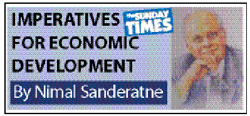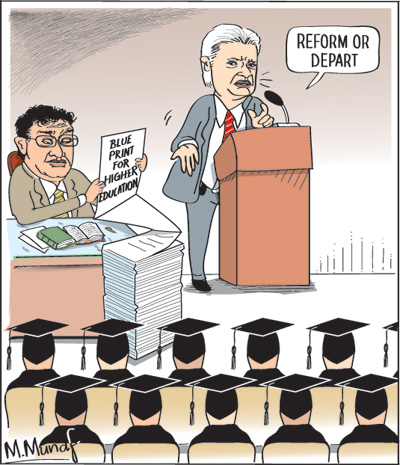Columns
Wide ranging reforms in higher education vital for economic surge
View(s):Reforming higher education is a challenging task. However difficult reforming higher education is, the country cannot achieve a significant thrust in economic and social development to be a modern developed nation without a wide range of qualitative improvements in higher education.
 Blue print
Blue print
Dr. Harsha Aturupane provided a blue print of the necessary wide ranging reforms in higher education in his Gamani Corea Memorial Lecture titled “Enriching and Accelerating Higher Education Development in Sri Lanka”. Last Sunday’s column discussed some of the critical areas that he expounded. Today we focus on some of the other reforms he suggested to ensure improvements in higher education.
Challenging
Higher education reforms are a most challenging task as they require ample financial resources, highly skilled resource personnel, a strong political resolve and enormous organisational capacities. Besides these, as Dr. Aturupane pointed out, reforms in university education cannot be effected without changes in school curricula.
School education
One of the fundamental weaknesses of school education is the lack of facilities for teaching of mathematics, science and English. Without adequate facilities for teaching these subjects, reforms in university education are not possible. Only about ten percent of schools have facilities for teaching mathematics and science. This serious flaw has to be remedied if reforms in university education are to be corrected.
Apart from finances, there are constraints in finding qualified teachers. Innovative measures such as seconding university academics for teaching spells, short courses for teachers, recruitment of qualified retired teachers, higher remuneration and inviting foreign teachers are ways of overcoming this bottleneck.
 Outcome-Based Learning
Outcome-Based Learning
Dr. Harsha Aturupane, Lead Education Specialist of the World Bank, observed that the global trend in teaching-learning among modern universities and higher education institutions was to move away from input-based education and teacher-cantered methods to outcome-based education and student cantered learning. These provide a constructive framework for the integration of curricula, teaching-learning activities and assessment methods to produce desired outcomes of study programs. Student centred learning is an active learning process, where students directly interact with their study material and engage among themselves, with staff members mainly playing a guiding role. The impact of such learning is stronger and more enduring than traditional teacher centred methods and can be used to implement outcome-based education.
Student centered learning
Aturupane spelled out methods that could be introduced and said that student cantered learning is also redefining learning spaces in universities. The traditional large lecture theatres and halls are being complemented and supplemented through a range of learning spaces that seek to promote collaborative and team oriented learning. Concepts such as greater use of light and air, circular or oval tables, flexible seating, individual and personalized spaces for students and staff, and smaller open learning spaces for group-based learning are increasingly emphasized.
Modern methods
Aturupane said that although some Sri Lankan degree programs are following these methods, a substantial number of study programs still need to make the transition into these modern teaching-learning methods. Trained academic staff in the concepts and methods, curricula, pedagogy and assessment systems, teaching learning-material, equipment (particularly ICT) and physical facilities are required to expand these methods that should be complemented by appropriate quality assurance framework at the program and institutional levels.
ICT
Information and Communications Technology (ICT) is essential to support and enhance teaching, learning and research in today’s dynamic and rapidly evolving global environment. The trend in higher education is mobile learning and One-to-One Computing with the swift expansion of mobile telephony with smart phones and tablet devices that have revolutionized ICT technology over the last decade in higher education. The trend in universities around the world is to create learning environments that assume universal access to ICT and the internet, including providing every student with IT equipment or expecting each student to own a personal device that can access the internet. The Internet that provides enormous qualitative higher educational resources needs to become an integral feature of university teaching and learning.
Socio-emotional skills
An important and yet little discussed issue brought out by Dr. Aturupane was Socio-emotional skills that are among the most important determinants of economic performance over the life-cycle. The main socio-emotional skills needed in the labour market include problem solving, resilience, achievement motivation, control, team work, initiative, confidence and ethics. Higher education institutions are increasingly emphasising the development of these socio-emotional skills among students. These skills are especially important in arts, commerce, humanities, management, natural science and social science programs, where students are not trained for a specific occupation, but may work in a wide range of occupations.
Research and innovation
Dr.Aturupane pointed out that it is extremely important for Sri Lankan universities to conduct research to gain international recognition as centres of excellence and for gaining international rankings of universities. The government has taken several significant steps to promote academic research. Universities award substantial importance for research publications in academic promotions and grant a research allowance as an incentive and reward. However, he pointed out, that there are constraints to research, especially a shortage of funds for equipment and material, and physical distance from major global centres of research.
Information technology
High-speed internet connections and relatively inexpensive IT equipment has transformed the global and national research environment. There is increasingly greater research collaboration among academics across universities, countries and even continents. ICT enables academics from developing countries to collaborate with global peers and access expensive instruments and large data sets.
Since our universities cannot afford the high cost of ownership of instruments such supercomputers, electron microscopes, astronomical telescopes, medical imaging, and simulators, Dr. Aturupane said it is possible to lease time on such equipment and access them through high-speed networks. These developments, he pointed out, have opened up new opportunities for academics from lower-middle income countries to undertake basic research. The government could encourage such activities, especially by helping academics to network with wealthier universities and engage in research collaborations.
Conclusion
Dr Aturupane’s wide-ranging agenda for the development of higher education in Sri Lanka also dealt with private universities for profit and not for profit, internationalisation of university education, fundamental and academic research. It is a blue print that requires to be systematically and sequentially implemented.
Sri Lankan higher education institutions need to advance swiftly over a broad front to play a leading role in the economic, cultural and social transformation of the country. This daunting and challenging task is however vital for the nation’s development. Weak public finances would be a serious impediment to improving higher education.


Leave a Reply
Post Comment